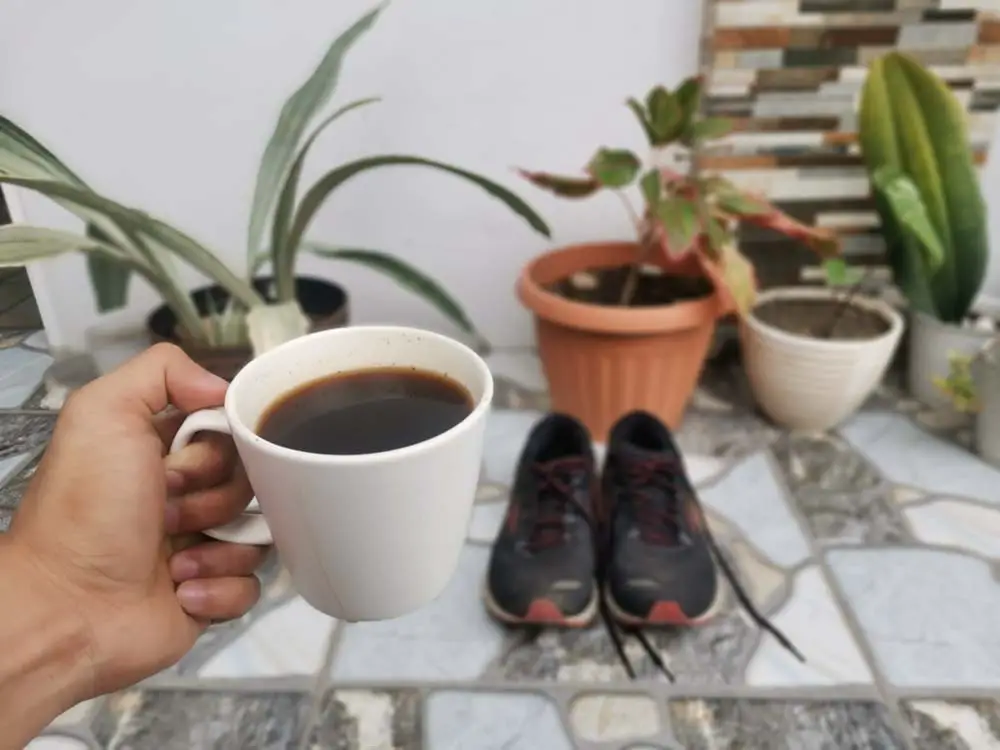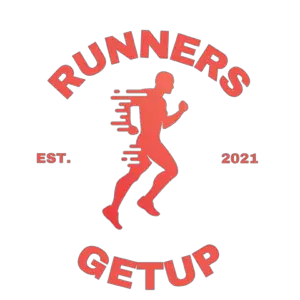This post contains affiliate links.

Ahh, coffee… The thing that keeps me awake and ready to tackle my morning run. But is there any scientific evidence that supports drinking coffee? How much coffee should I drink and when’s the right to drink it? Here’s what I found in my research.
The caffeine found in coffee has been proven to improve athletic performance. It is best to drink 2-3 cups of coffee 60 mins before a run to ensure optimal absorption. However, research has shown that drinking coffee 15-30 mins before a run is enough time to benefit from the boost in performance.
But that’s not all. There’s a lot of discussions to be made around coffee and performance. And in this article, we will look at what the literature has to say about drinking coffee before running. Let’s get right into it.
Caffeine And How It Works
Before we dive down into the actual relationship between coffee and performance, let’s first discuss the fundamental ingredient of coffee… caffeine.
Caffeine is a naturally occurring substance found in various plant species including cocoa beans, coffee beans, and yerba maté. It is a compound found not only in coffee but in most tea, dark chocolates, and energy drinks.
But how does it work exactly?
According to International Study of Sports Nutrition, there are several proposed mechanism that tries to explain the effect of caffeine in relation to the enhancement of performance. However, the most relevant mechanism is that caffeine competes with adenosine—a chemical that makes us feel drowsy, to its receptor; therefore, preventing us from feeling drowsy.
How Much Caffeine is Found In Coffee?
As we’ve discussed, caffeine is the actual substance that affects our performance and coffee is just a drink where we could find it. So the question is… How much caffeine is in a cup of coffee?
Well, it depends on the type of coffee you drink.
Here’s a table that I summarized from Healthline.com of the average amount of caffeine found per serving of the different ways of making coffee:
| Type of Coffee | Serving size | Amount of caffeine |
|---|---|---|
| Brewed Coffee | 8 oz (237 mL) | 70-140 mg |
| Cold Brew | 12 oz (355 mL) | 138-153 mg |
| Espresso | 1-1.75 oz (30-50 mL) | Single shot: 63 mg Double shot: 125 mg |
| Espresso-based (Capuccino, Macchiato, Americano) | 8-16 oz (227-454 mL) | 63-125 mg |
| Instant Coffee | 8 oz (237mL) | 30-90 mg |
| Decaf Coffee | 8 oz | 0-7 mg |
As you can see, decaf coffee has the least amount of caffeine while cold brew has the most amount of caffeine on the list.
It could also vary on the type of beans used for that coffee, but, that’s a topic for coffee bloggers.
Does Coffee Help Improve Performance?
Caffeine has been used in athletics for decades. Some athletes swear by it while others don’t even bother to take a sip. But what does the literature say about drinking coffee (or any caffeinated drink) and improving performance?
A recent article published by the International Journal and Exercise Metabolism about caffeine and performance stated that caffeine boosts performance for both prolonged endurance exercises and short but intense 5 mins exercises in the laboratory.
Another article published by the Medicine & Science in Sports Medicine concluded that caffeine boosts the performance of athletes competing over consecutive days despite the increase in muscle damage after an enhanced performance on the first day.
Based on these studies, it’s safe to assume that drinking coffee prior to a run could help you perform better.
But there’s a catch… the effects in performance seem to benefit only well-trained and conditioned athletes.
In other words, if you’re someone who’s never trained and is simply looking for a boost performance for an upcoming race, caffeine can’t help you.
Is It Okay To Drink Coffee Before A Run?

Coffee has a mild diuretic effect (causes loss of bodily fluid) which is probably the reason why some runners prefer to stay away from caffeine before a run. I get the argument. Some fear that drinking coffee before a run could cause a rapid loss of bodily fluids and can lead to dehydration. But what does the research say about that?
The International Journal of Sports Nutrition reviewed several pieces of literature on coffee and performance. One conclusion they’ve drawn is that several studies have failed to show changes in sweat rate, total water loss, or negative changes in fluid balance—the thing most anti-coffee runners argue about.
In other words, drinking coffee prior to a run does not increase sweat rate or loss of bodily fluid to the point where it affects performance.
But coffee is a diuretic, doesn’t it lead to dehydration?
Sure, coffee has some mild diuretic effect, but it is also made of 95% water. Contrary to popular belief, recent research suggests that coffee doesn’t appear to increase the risk of dehydration during exercise. The diuretic effect of coffee is not enough to offset the fluid intake that we get from coffee.
This is backed by a study whose aim was to compare the effects of coffee against water consumption using validated hydration assessment techniques.
An article published in 2014 measured the total body water of 50 participants who drank either coffee or water for 3 days each trial and found that there is no significant changes in the total body water from the beginning and end of the trial.
What’s more surprising is that there was no significant difference between trials. The researchers concluded that coffee, consumed in moderation, provided similar hydrating qualities to water.
Not to say that you should replace water with coffee. Water is still the best, most cost-effective, and safest drink out there. What I’m trying to point out is that you shouldn’t freak out about drinking coffee prior to running.
When Is The Best Time To Drink Coffee Before A Run?
I’m a guy who stresses out the finest details of everything I do. That includes the best time to drink my favorite cup of coffee prior to a run. So to find out, I did what I always do, research and ask questions.
Most running coaches and experts recommend drinking coffee 45-60 mins before going out for a run to ensure the optimal absorption of caffeine; however, research suggests that caffeine, taken 15-30 mins before exercise is enough to benefit from the boost in performance.
I, personally, drink a cup of strong brewed coffee right after I wake up (if I decided to run in the morning). Then I wait it out to go to the bathroom before I warm up and run. It usually takes me around 45 mins to finish my routine.
I like running on an empty stomach. And by the way, I made an article about running on an empty stomach and how it affects muscle mass. It’s an interesting read, be sure to check it out.
How Much Coffee Should You Drink?
So, the big question… How much coffee should you drink? Well, it’s different from person to person and the amount of caffeine in the coffee. But based on the literature, there is an optimal range of caffeine to get a boost in performance.
As a general rule, you should drink 3-6 mg of caffeine per kilogram of body weight to get the benefits of caffeine in enhancing performance; consuming a higher dosage of caffeine (≥9 mg/kg) showed no further benefit in performance.
Yes, mg of caffeine, but how does it translate to cups of coffee. Don’t worry, I got you.
Based on the data that we have on the optimal amount of caffeine per kilogram of body weight and the amount of caffeine found in different each cup of brewed coffee (because it’s the most common coffee at home), I created this table that you can use as a guide:
| Bodyweight | Caffeine Dosage | Servings of Coffee |
|---|---|---|
| 120 lbs (55 kg) | 165-330 mg | 2-3 cups of brewed coffee |
| 140 lbs (64 kg) | 195-390 mg | 2-4 cups of brewed coffee |
| 160 lbs (72 kg) | 216-432 mg | 2 1/2-5 cups of brewed coffee |
| 180 lbs (82 kg) | 246-492 mg | 3-5 cups of brewed coffee |
| 200 lbs (91 kg) | 273-546 mg | 3-5 1/2 cups of brewed coffee |
| 220 lbs (100 kg) | 300-600 mg | 3 1/2-6 cups of brewed coffee |
Note that the average caffeine found in an 8 oz cup of brewed coffee is 95 mg. This is where the calculation is derived from.
Of course, this is going to vary depending on the type of coffee you use or the size of your cup/mug.
If you’re a mug guy, it’s okay to drink 1 serving on a big mug rather than 2 small cups. Also, some coffee may be stronger than others, so adjust your cups accordingly.
Risks Of Drinking Coffee Before A Run
Although coffee is generally safe for most people, some people experience headaches, heart palpitations, and dizziness.
People with high caffeine sensitivity should take lesser amounts of caffeine to avoid these adverse effects.
Drinking coffee can also cause gastrointestinal problems. Caffeine has some laxative properties. Pair that with milk, it can cause some serious intra-run problems (having to run to the bathroom instead of the finish line).
So if you are lactose intolerant, skip the milk.
Ingesting caffeine can cause difficulty in falling asleep. So, evening runners, you might want to skip the coffee or switch to a morning run.
How Other Runners Take Their Coffee
To give you an idea of how other runners take their pre-run coffee, I’ve asked a couple of runners around the area and asked some forums.
The first runner I asked said he drinks a mug of instant coffee 30 mins before a run. He uses it primarily to take a dump before his run.
Another runner that I interviewed said a double shot espresso is the way to go. It gives him the kick he needs to chase a faster mile.
Scrolling down through Reddit threads, I found someone who drinks 2 cups of brewed coffee before going out for a run. He said it helped him stay alert, especially when he goes for an early morning run.
Another Reddit user avoids anything with milk at all cost. He said he’s having problems when he’s running particularly when his coffee contains milk. A simple, unsweetened cup of coffee is his caffeine of choice.
A friend of mine (although he’s not a runner) grabs a Grande cold cappuccino from Starbucks just before going into the gym. He says he can’t function without it.
Point is, any coffee is fine as long as it works for you. Try out different kinds of coffee and when you find the best one, make it your pre-run drink and be consistent.
Conclusion
Coffee has some performance-enhancing benefits with few side effects. However, that doesn’t mean that coffee alone can help you break personal bests or run longer. Discipline and consistency in training are still key to becoming a better runner.
